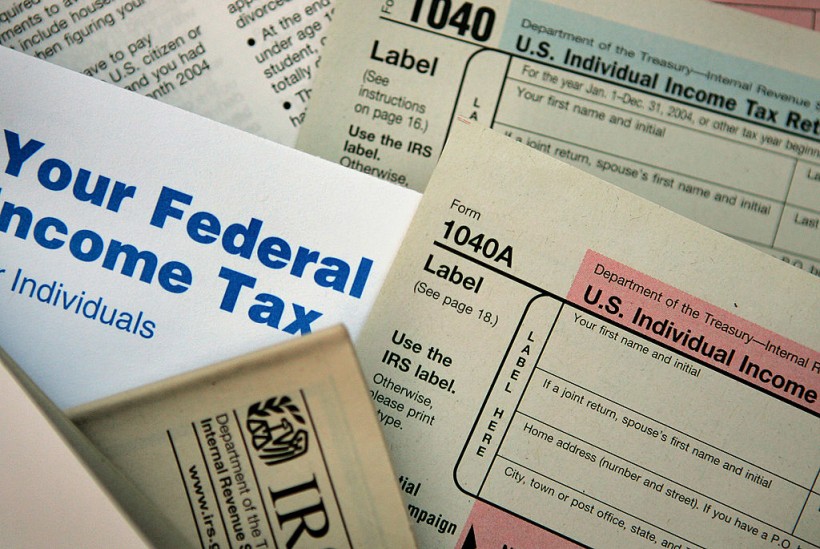
(Photo : Scott Olson/Getty Images)
There have been numerous articles about IRS stimulus payments for 2023. However, you may fall victim to new schemes. To clarify, here is what your state may offer!
Multiple economic stimulus payments were distributed to Americans during the pandemic, but it appears that the federal government has no plans to send any more. However, states send their citizens financial assistance, which some have termed "stimulus payments."
But you still need to know the truth about stimulus check 2023 and whether or not every state resident will receive one. Three installments of economic impact payments, also known as stimulus checks, were distributed by the federal government in 2020 and 2021 to provide financial relief to many Americans during the COVID-19 pandemic.
In addition, you should be aware of schemes that may lead you to believe that the Internal Revenue Service (IRS) agents are calling Americans to request tax refunds. Do not be fooled! Here are the facts you must know!
IRS New Scams in 2023
According to Verify This, some citizens reported receiving emails purporting to be from the Internal Revenue Service with the subject line 'Third Round of Economic Impact Payments Status Available.'
The emails claim that recipients can claim a tax refund for 2023 if they provide missing information and transmit a document to what appears to be the IRS. Here's the truth!
No, the IRS is not emailing taxpayers regarding the third round of economic impact payments. This scheme is fraud.
First, these fraudulent emails assert that the IRS will provide an update on the third round of economic impact payments. But this is not true. Since October 2021, identity fraudsters have been using economic impact payments to deceive people into divulging their personal or financial information, according to the Federal Trade Commission (FTC) and the IRS.
However, the IRS will no longer issue these payments after 2023. The American Rescue Plan Act of 2021 stipulated that the third and final round of economic impact payments must be distributed by December 31, 2021.
Second, these phishing emails claim taxpayers are eligible for a tax refund after providing the IRS with lacking information by selecting the "complete my information" link at the bottom of the email. However, this is not how the IRS processes tax refunds.
If the IRS requires additional information from a taxpayer, it will send them a letter via conventional mail, according to the agency. Because the IRS does not instigate contact with taxpayers via email, text message, or social media to request personal or financial information, this is the case.
The IRS states that it typically issues tax refunds within 21 days of receiving a federal income tax return. However, as of July 17, 2023, the agency reports delays in processing returns.
If you have received an email containing a request for confidential information purporting to be from the Internal Revenue Service, the IRS advises you to follow these guidelines.
-
Do not respond.
-
Never open attachments. These may contain malware that can infect your computer or mobile device.
-
Avoid clicking any links. Visit the IRS page on identity protection if you enter sensitive information after clicking on links in a suspicious email or website.
-
Forward the email (preferably with the complete email headers) to phishing@irs.gov. Do not transmit scanned images, as this eliminates valuable information.
-
Remove the initial email.
Using the Where's My Refund? tool on the IRS website, you can obtain the latest information regarding the status of your tax refund.
If you have suffered financial losses as a result of IRS-related fraud, you can submit a report to the Treasury Inspector General for Tax Administration (TIGTA) and a complaint with the Federal Trade Commission (FTC).
IRS Warning
Partners of the IRS and Security Summit routinely inform the public about common schemes, such as the annual IRS Dirty Dozen list. Taxpayers and tax professionals should be wary of fraudulent communications purporting to be from legitimate tax and financial institutions, such as the IRS and states.
Phishing and smishing are two types of identity fraud that can result from unsuspecting victims providing sensitive personal and financial information in response to unsolicited text or email messages.
Regarding tax bills or refunds, the IRS never initiates contact with taxpayers via email, text message, or social media. As a reminder, do not open any unsolicited communication purporting to be from the IRS, as it may covertly install malware.
It may also be a method for malicious hackers to install ransomware that prevents the user from accessing their system and files. Individuals should never respond to or act on tax-related phishing or smishing emails or URLs.
Instead, hoaxes should be reported by forwarding the email or a copy of the text/SMS to phishing@irs.gov as an attachment. The report should contain the recipient ID (email address or phone number), date, time, time zone, and the number that received the message.
Read Also: US Unveils $340 Million Military Aid Package for Taiwan Amid Rising Tensions Against China
What States Are Providing Instead?
Nonetheless, certain states intend to send residents stimulus payments in 2023.
Here is a list of states contemplating other financial aids, according to GoBankingRates. Check to see if your state is on the list and if you qualify for the funding.
California
Approximately $200 to $1,050, based on your income, filing status, and dependent status. California's Middle Class Tax Refunds are available to citizens who filed their 2020 California state tax return by October 15, 2021, and who resided in California full-time for at least six months in 2020.
If Californians could not be claimed as tax dependents in 2020 on someone else's return and did not exceed the California adjusted gross income limit - $250,000 for single people and married couples filing separate tax returns or over $500,000 for others - then there is a good chance that they will receive a payment in the first half of 2023.
Idaho
More than (1) $75 per family member or (2) 12% of the tax liability before credits, "other" taxes, and first-year rebate payments. Equal to (1) $600 for married couples filing a joint return or $300 for all other filers, or (2)10% of the taxpayer's 2020 tax liability before credits, additional taxes, payments, and donations.
It involves complex mathematics that totals a good sum for Idahoans. The state issued two tax rebates to full-year Idaho residents who filed state income taxes for the years 2020 and 2021 by the end of 2022. Throughout 2023, rebate payments will be sent to Idaho residents who filed the requisite tax returns in 2022.
Through The Idaho Tax Commission's Frequently Asked Questions section, residents can track the status of their rebate payments and obtain additional details.
Maine
The state provides $450 for single filers and $900 for married couples filing state taxes in 2021. There is a new payment for 2023 for residents of Maine who lived in the state full-time and filed their 2021 tax return by October 31, 2022.
It is known as the Winter Energy Assistance Payment. As long as the federal adjusted gross income (AGI) reported on the 2021 Maine tax return was less than $100,000 (single taxpayers and married couples filing separate returns), $150,000 (heads of household), or $200,000 (married filers with joint returns), taxpayers may be eligible for payments sent by March 31, 2023.
New Jersey
The ANCHOR Tax Relief Program will send rebates of $1,500 to New Jersey homeowners who owned a residence in 2019 and earned less than $150,000.
Homeowners with a household income between $150,001 and $250,000 can anticipate $1,000 in payments. New Jersey renters with an adjusted gross income of $150,000 or less on their 2019 tax return are eligible for a $450 rebate.
According to the state tax guide, eligible New Jersey residents qualify for $500 for each ITIN holder listed on their tax return under the ITIN program.
New Mexico
In 2021, joint filers, heads of household, and surviving spouses will receive $1,000, while solitary residents and married couples filing separately will receive $500.
New Mexico residents are scheduled to receive rebates in 2023. If you file a 2021 New Mexico state tax return by May 31, 2023, and are not claimed as a dependent on another taxpayer's return, you may be eligible for the initial stimulus payment.
The second stimulus is included in a law slated for passage at the end of March.
Pennsylvania
If you are a Pennsylvania resident over the age of 65, a widow(er) over the age of 50, or a person with a disability over the age of 18, you may be eligible for a stimulus payment through the 'Property Tax/Rent Rebate' program. The annual income limit for homeowners is $35,000, while the limit for tenants is $15,000.
Also, 50% of Social Security benefits and a 70% reduction of any 2021 property tax rebate are excluded.
South Carolina
What a resident may receive varies based on filing status for 2021 South Carolina income tax liability, less credits, with a $800 limit on the rebate amount. Due to the effects of Hurricane Ian, South Carolina rebates will be distributed in two phases, depending on the date you submitted your 2021 South Carolina tax return.
Those who filed by October 17, 2022, should have already received their funds, while those who missed the deadline but filed by February 15, 2023, should receive their payments by March 31, 2023.
Use the South Carolina Department of Revenue's tracker to keep a watch out for your rebate if you are a South Carolina resident inquiring about the status of your refund.
Related Article: IRS Urges Special Refund Recipients To Delay Filing Taxes









